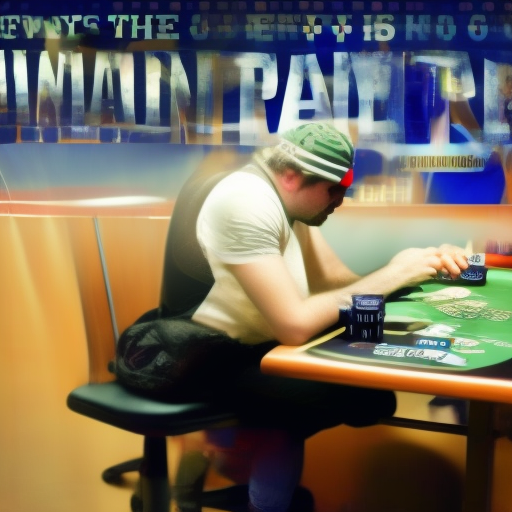If you have ever been intrigued by how tournament poker players think and play their cards, then you’re in for a treat. As we delve into the mind of a tournament poker player, you will be in awe of their well-trained strategies, intricate knowledge, and supreme levels of focus. Follow along closely, as this is one journey not to be forgotten.
The Strategy and Psychology of Tournament Poker
Playing poker can be a thrilling experience, and that excitement is taken up a notch when you’re in a tournament setting. Unlike regular cash games where you can buy-in and leave at will, tournaments have a set buy-in and structure that forces players to strategize if they want to stay in the game. In this post section, we’ll dive into .
First and foremost, understanding the structure of the tournament is essential. You need to know how many chips you start with, how quickly the blinds increase, and the payout structure. With that information in mind, you can make strategic decisions such as when to take risks or when to play conservatively. It’s also important to note that tournament poker requires a different mindset compared to cash games. The goal isn’t necessarily to win every hand, but rather to outlast the other players and make it to the final table. This means that patience is key, and you need to be able to manage your stack effectively to make it to the later stages of the tournament. In summary, to be successful in tournament poker, you need to have a solid understanding of the structure, play strategically, and be mentally prepared for the long haul. So, are you ready to outsmart your opponents and take home the prize?
Analyzing Opponents in Tournament Play
When it comes to tournament play, you don’t just want to win. You want to crush your opponents, figuratively speaking, that is. But before you can do that, you need to know your opponents like the back of your hand. That’s where analyzing comes in.
So how do you analyze your opponents? Here are a few tips:
- Observe their playing style. Do they tend to be aggressive, passive, or somewhere in between?
- Take note of their betting tendencies. Do they tend to bet high or low?
- Look for patterns in their behavior. Do they tend to bluff or fold easily?
By using these tips, you can get a better understanding of your opponents and adjust your playing style accordingly. Remember, the goal is to stay one step ahead of them at all times. Good luck out there!
Staying Focused and Managing Mental Fatigue
Feeling mentally drained after a long day at work or study is something that we can all relate to. It can be difficult to stay focused and motivated when we’re feeling mentally fatigued, but there are some simple things we can do to help manage this.
Firstly, it’s important to take regular breaks throughout the day. This might mean taking a quick 5-minute walk outside or simply closing your eyes and taking some deep breaths. Giving your brain a rest, even for just a few minutes, can help to replenish your mental energy and improve your overall focus. Secondly, make sure to prioritize your workload, as trying to tackle too many tasks at once can quickly lead to burnout. Consider breaking down larger tasks into smaller, more manageable chunks, and prioritize based on urgency or importance. Finally, try to schedule your most important or challenging work for times when you know you’re at your most alert and productive. Whether that’s first thing in the morning or after a break, be mindful of your natural energy ebbs and flows and use them to your advantage.
In summary, managing mental fatigue requires a combination of self-awareness and self-care. By taking regular breaks, prioritizing your workload, and planning your most important work for optimal times, you can stay focused and avoid burnout. Remember, managing your mental health is just as important as managing your workload, so be sure to give yourself the time and space you need to perform at your best.
Adapting to Different Playing Styles
When you’re in the middle of a game, it can be hard to adapt to different playing styles, but it’s an essential skill to have. It’s like playing rock-paper-scissors – you have to be able to read your opponent to be successful. Here are a few tips that will help you become a more adaptable player:
• Watch and Learn – Observe your opponents’ playing style and take mental notes. Do they play aggressively? Are they more defensive? Understanding their style will help you adjust your approach.
• Be Patient – Don’t try to force your own style onto the game. Sometimes it’s better to take a step back, assess the situation and adjust your playing style accordingly.
Remember, is not something you’ll learn overnight. It takes practice and patience to become a adaptable player. But if you keep at it, you’ll soon find yourself winning games that you once thought were impossible to win. So keep calm, keep an open mind and most importantly, have fun! For tournament poker players, a large part of their success can be credited to their extraordinary mindsets. Thinking strategically and playing mindfully are crucial in becoming a renowned player and they are essential skills so that one can stay in the game and come out victorious. Now you too can tap into the power of the mind to win the tournament and come away with a handsome prize!